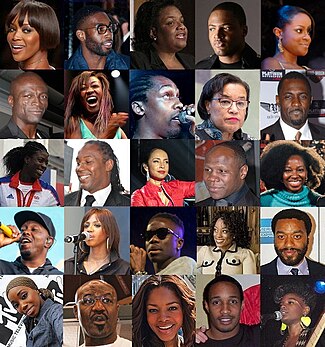 |
| Black Britons |
The ethnic population of England and Wales is growing according to new figures published by Office of National statistics.
Out of a population of 54 million, black ethnic communities have grown by almost 3 million over the last 10 years. There are now almost 1 million people of mixed parentage: an increase of nearly 50% whilst the white ethnic birth rate has flat lined.
Despite the problems of making predictions, on the basis of this evidence there will be 2.4 million black and ethnic minority people aged 50 and over in 2016 in England and Wales; rising to 3.8 million by 2026 and 7.4 million by 2051.
In terms of the aging nature of black communities there will be just over half a million black and minority ethnic people aged 70 and over by 2016, more than 800,000 by 2026 and that figure escalates to 2.8 million by 2051.
The spectacular growth of black communities will continue and we as a community are going to have to deal with an increasing aged population and all the issues that entails. Resource provision for our elderly will become a big political issue as our community continues to grow and mature.
On the wider issue the debate about multiculturalism in the UK has been largely lead in recent times by the Prime Minister himself. Cameron’s perspective is largely confused and reactionary on this issue. Here are the Prime Minister’s thoughts are on this issue,
“Under the doctrine of state multiculturalism, we have encouraged different cultures to live separate lives, apart from each other and the mainstream. We have failed to provide a vision of society to which they feel they want to belong. We have even tolerated these segregated communities behaving in ways that run counter to our values.”
He added, “Frankly, we need a lot less of the passive tolerance of recent years and much more active, muscular liberalism. A passively tolerant society says to its citizens: as long as you obey the law, we will leave you alone. It stands neutral between different values. A genuinely liberal country does much more.”
Cameron on the issue of multiculturalism reminds me of one of the greatest British medieval Kings the magnificent King Cnut. Henry of Huntingdon, the 12th-century chronicler, tells how King Cnut the Great set his throne by the sea shore and commanded the tide to halt and not wet his feet and robes. Yet "continuing to rise as usual [the tide] dashed over his feet and legs without respect to his royal person. Then the king leapt backwards, saying: "Let all men know how empty and worthless is the power of kings, for there is none worthy of the name, but He whom heaven, earth, and sea obey by eternal laws."
Much like Cnut, Cameron rails against the inexorable process of globilisation and demographic change. The point of such a perspective in my view is to seek to divert attention away from the current cuts to public services and instead focus people’s attention on ‘those problematic black communities” who insist on being obviously black.
Of course from a black perspective the Prime Minister preferred approach of muscular liberalism is not the answer, because its emphasis on individualism suggests that ethnicity and culture are matters of choice. In fact we are born into our culture, which is infused with tradition, history and religion. Of course this culture is dynamic, one that changes and evolves over time, as do all cultures. However the underlying base foundations of a culture will remain whatever the current contempory expressions. Part of the problem or British culture is its inherent tradition of racism.
What is needed in Britain right now is an aggressive assertion of blackness. This had been a universal force for good here in the UK and its expression has led to one of the most socially integrated societies in Europe.
I have a profound and intense dislike of the acute and predominantly white perspective epitomized and expressed by the notion that Britain is a tolerant country and that black people should be very grateful. I don’t want to be tolerated. Further you have no right to see me, as a fifth generation British citizen, as someone that requires toleration.
That this term is the predominant explanatory discourse advanced by many who propose assimilation rather than integration exposes the deep racial qualification that informs the idea of British citizenship. Put simply there is still no black in the union jack.

